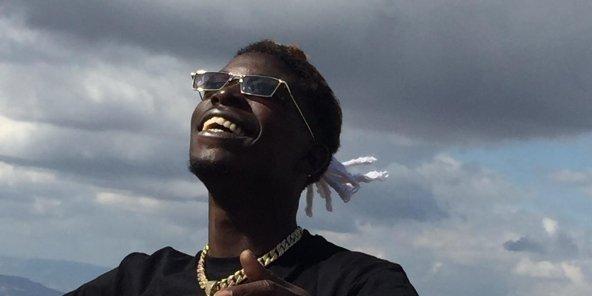Algeria: Chek, the Malian artist who fell in love with Kabylie<
A Malian who sings and promotes Kabyle culture? It was enough to make this artist the darling of an entire region.
He is 25 years old, his name is Cheick Tidiane Coulibaly, but his many friends and admirers call him Chek and his artist name is Chee. For the past few weeks, this Malian student who landed three years ago in the city of Tizi-Ouzou to study human resources management in a private institute, has been creating a buzz with a song called “Imazighen” (“the Berbers “) posted on YouTube.
In the clip, Chek is filmed singing and dancing with three Malian women dressed in Kabyle dresses at various emblematic sites in Kabylia such as the tomb of Matoub Lounès, the singer and standard bearer of the fight for Berber culture, assassinated in June 1998.
Difficult beginnings
A Malian who sings in Kabyle to promote Kabylia and Berber culture: the fact is quite unusual not to go unnoticed. The reactions, a mixture of astonishment and admiration, are not long in coming.
To ReadAlgeria: stroll through the self-managed villages of KabylieThe young songwriter, who raps, shakes up dress and language codes, blurs cultural boundaries. Chek arrived in Kabylie with his XXL smile and his joie de vivre to give a good kick in the established certainties.
“Chek is a very open and curious boy. He is interested in everything, wants to know everything and works non-stop,” says his friend Riad, who has known him for 3 years.
Chek is the youngest of three boys from the town of Manantali in southwestern Mali. The family went up to the north of the country to follow the wanderings of the father, a soldier, and the mother, who works for the International Red Cross.

Arriving in Algeria in 2018, Chek is far from thrilled by the atmosphere. "At first, I didn't like it at all. I thought I was not going to stay here, but over time I made friends. I rubbed shoulders with the Kabyles and they treated me like a brother. I really liked this mentality and that's how I fitted in,” he says under the smiling gaze of Riad, his friend, and Abdennour, his publisher and manager.
“People loved it”
Chek's love affair with Kabylia begins in 2019, on the occasion of Yennayer, the Berber New Year, when friends ask him to play the model during the fashion show that students organize for the evening of this year. traditional feast.
“People loved it. Even more when I spoke with the few words of Kabyle that I knew then, he says with that big smile that never leaves him. It made them really happy, ”he says again.
To ReadAlgeria: duel of gunslingers uncles on the Kabyle questionEndearing by nature and open to others, Chek has no trouble making friends and integrating into this society of freedom-loving mountaineers. Over the months, he visits the mountains and villages of Kabylie, memorizes words and expressions, takes notes. He slowly discovers this "vast Berber culture" and says he admires and respects the "long struggle of the Kabyles to keep alive their culture and their age-old identity".
A model always dressed to the nines, Chek already did not go unnoticed in the streets of Tizi-Ouzou. With his peroxide dreadlocks, his impeccable suits, his big golden medallion, it is difficult not to notice the young man. Since the clip, people now stop him in the street to take pictures with him.
“A lot of people call me to cheer me on and that makes me really happy,” he says. Jealousy, negative or even racist comments on social networks, Chek brushes them aside. “You can't force someone to love you. I tell them: Ghas uyith hemledh ara, nekkini hemlaghak! (“Even if you don't love me, I love you”)”, he decides in a Kabyle tinged with a Bambara accent.
Forge links with sub-Saharan artists
The reactions in the country as in Tizi-Ouzou are mostly positive. “Some people don't appreciate that I'm with the Kabyles all the time, but many are very happy and think that I'm going to forge links between the communities. After all, nothing better than music to bring people together and unite across borders,” he concludes.
To ReadOlive oil: Hakim Alilèche wears high the colors of AlgeriaAnd Chek wants to go further. He plans to make a great clip at home, in Mali, by mixing symbols and cultural references. “It is also possible to do something with local artists and to forge links between them and their Malian, Ivorian, Senegalese, Guinean, etc. colleagues. “, he says. Its producer and publisher, Abdenour, says he is ready to go to Mali to carry out this mixture of cultures.
It is quite common, since the 1970s, to meet students from sub-Saharan Africa in Algerian universities. In recent years, thousands of African refugees fleeing war or drought have arrived in Algerian cities in the north after an unlikely crossing of the desert where they have often risked their lives in quits or doubles.
“In Tizi-Ouzou, we are used to seeing African players in the local club. Some have become great stars admired by all and it has been noticed in recent years that the many sub-Saharan refugees who have arrived in Kabylie have adapted very well to the customs of the region. Many speak Kabyle well enough to get by,” said Tahar Khouas, divisional tax inspector in Tizi-Ouzou.


 Tags:
Tags: Prev
Prev







